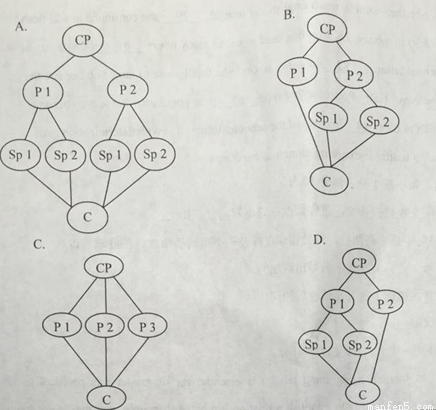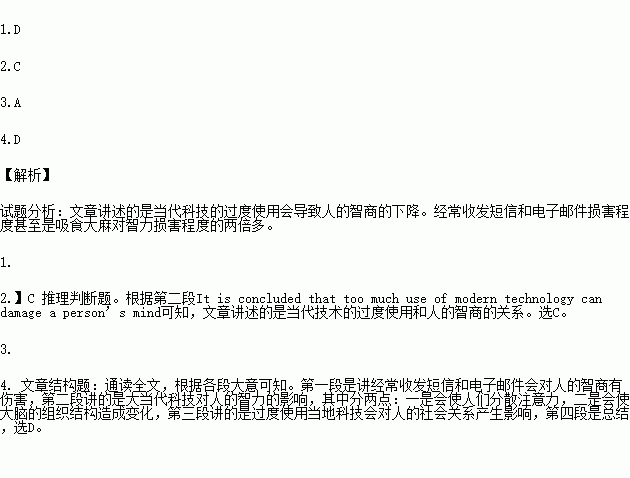题目内容
The regular use of text messages and e-mails can lower the IQ more than twice as much as smoking marijuana (大麻). That is the statement of researchers who have found that tapping away on a mobile phone or computer keyboard or checking for electronic messages temporarily knocks up to 10 points off the user’s IQ. This rate of decline in intelligence compared unfavorably with the four-point drop in IQ associated with smoking marijuana, according to British researchers, who have described the phenomenon of improved stupidity as “infomania”. The research conducted by Hewlett Packard, the technology company, has concluded that it is mainly a problem for adult workers, especially men.
It is concluded that too much use of modern technology can damage a person’s mind. It can cause a constant distraction of “always on” technology when employees should be concentrating on what they are paid to do. Infomania means that they lose concentration as their minds remain fixed in an almost permanent state of readiness to react to technology instead of focusing on the task in hand. The report also added that, in a long term, the brain will be considerably shaped by what we do to it and by the experience of daily life. At a microcellular(微蜂窝,微孔的) level, the complex networks of nerve cells that make up parts of the brain actually change in response to certain experiences.
Too much use of modern technology can be damaging not only to a person’s mind, but to their social relationship. 1100 adults were interviewed during the research. More than 62 percent of them admitted that they were addicted to checking their e-mails and text messages so often that they scrutinized work-related ones even when at home or on holiday. Half said that they always responded immediately to an e-mail and will even interrupt a meeting to do so. It is concluded that infomania is increasing stress and anxiety and affecting one’s characteristics. Nine out of ten thought that colleagues who answered e-mails or messages during a face-to-face meeting were extremely rude.
The effects on IQ were studied by Dr. Glenn Wilson, a psychologist at University of London. “This is a very real and widespread phenomenon,” he said. “We have found that infomania will damage a worker’s performance by reducing their mental sharpness and changing their social life. Companies should encourage a more balanced and appropriate way of working.”
1.We can learn from the passage that “infomania” ______.
A. has a positive influence on one’s IQ
B. results in the change of part of the brain
C. lies in the problem of lack of concentration
D. is caused by too much use of modern technology
2.The research mentioned in the passage is most probably about ______.
A. the important function of advanced technology
B. the damage to one’s brain done by unhealthy habits
C. the relevance between IQ and use of modern technology
D. the relationship between intelligence and working effectiveness
3.The underlined word “scrutinized” probably means “______”.
A. examined carefully B. copied patiently
C. corrected quickly D. admitted freely
4.Which of the following shows the structure of the passage?

CP: Central Point P: Point Sp: Sub-point(次要点) C: Conclusion |

